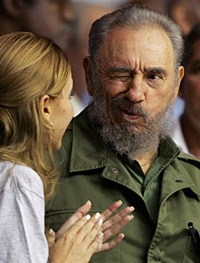 |
 |
 |
 Health & Beauty | November 2005 Health & Beauty | November 2005  
Cuba Spends A Lot to Fight Drugs
 Prensa Latina Prensa Latina


| | Cuban President Fidel Castro (R) winks at a woman at the graduation of hundreds of Cuban art students at Havana's Sports City October 28, 2005. The 79-year-old Cuban leader spoke for more than five hours standing at a lectern. (Claudia Daut/Reuters) |
Cuban Anti-Drug Commission head Jose Luis Galvan, at the first EU-Latin America and Caribbean Drug Observatory meeting in Caracas, noted that Cuba dedicates important resources to prevent drugs from contaminating the Island.

Galvan told Prensa Latina that although Cuba is on the international drug traffic route between the principal world drug producers and the principal consumer (the US), and despite its serious economic difficulties, Cuba takes strong steps to keep drugs out of the country.

He explained that drug traffickers throw packaged narcotics off boats to wash up on Cuban coasts as a step on the way to the US, and when they are found they are sunk in the sea.

Cuba is not the destination for drugs and has organized operations with the Interior Ministry, the Armed Forces and the national customs to keep it that way, he said.

He pointed to the "Peoples' Armor" operation that uses Cuban social organizations to neutralize national criminals who try to sell drugs, and these prevention plans are part and parcel of the Caribbean nation´s strengthening of its sovereignty.

Cuba also has a preventive program through the education ministries and youth and children´s organizations, he said.

He explained that Cuba does not have a drug observatory per se, but has a centralized mechanism through the national commission that receives research, analysis and statistics as well as trends and epidemiology studies. | 
 | |
 |



